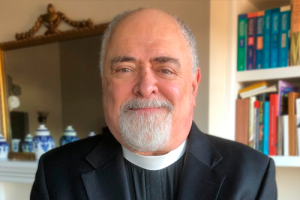Chris Dreisbach: Leading with Philosophy, Virtue, and Faith
Published July 22, 2025
 For Chris Dreisbach, life has been a leap of faith.
For Chris Dreisbach, life has been a leap of faith.
Associate director of the MS in Organizational Leadership program in the Advanced Academic Programs division of Johns Hopkins University, Dreisbach also is an author, a lover of philosophy and ethics, a girl dad to two grown daughters, and a grandfather of two granddaughters. He is in active ministry as an ordained Episcopalian priest who has served on the ethics committee of Sheppard Pratt Hospital in Maryland since 2009 and recently received an appointment to the Governor’s Commission of the Maryland Stem Cell Research Fund. The organization works to develop new medical strategies for the prevention, diagnosis, treatment, and cure of human diseases, injuries, and conditions through human stem cells.
A Hopkins alum (MA and PhD, he earned a BA in Philosophy from Hamline University), Dreisbach has also served as a senior lecturer for the MS in Biotechnology, MA in Communication, and Master of Liberal Arts programs and has a joint courtesy appointment with JHU’s Carey Business School. Dreisbach is a part-time professor of moral and systematic theology at St. Mary’s Ecumenical Institute and a frequent lecturer on leadership ethics for federal, state, and local law enforcement agencies, and on moral and systematic theology for religious organizations.
No one is more surprised by the impressive resume than Dreisbach himself.
“Most of what has happened to me has been in spite of me and because of God’s imagination,” he said. “From the time I took an interest in philosophy, I have always seen it as a mission, and I have devoted my life’s professional focus to ethics and public philosophy.”
Dreisbach began teaching philosophy in higher education when he was 23 years old. While a full-time tenured faculty member at the College of Notre Dame of Maryland, a then all-female Catholic school, he took on a part-time gig in 1994 teaching an ethics course in the Police Executive Leadership program at Hopkins. By 2000, he was teaching a second course on the Constitution and ethics.
“When I made the decision in 2004 to join the Hopkins faculty full-time, I went from being a big fish in a small pond, surrounded by Catholic nuns whom I adored and respected, to a goldfish in the ocean,” he said. “Some of my colleagues told me that this leap would have terrified them. I loved it. I realized that I could do anything I am capable of, and I grew tremendously professionally.”
Dreisbach has called on all his life experiences to enhance his role in the MS in Organizational Leadership program.
“Being a priest makes me a better teacher,” said Dreisbach, who is currently an interim priest at All Saints Episcopal Church on East 60th Street in Manhattan and previously served at Old Saint Paul’s Church in Baltimore. “I learned through my theology training, through my discernment for the priesthood, and from the remarkable School Sisters of Notre Dame about humanity. Most especially, I learned about the importance of Agape love that directs us to see humanity in others and the dignity they should be afforded automatically just by the virtue of their being. Leadership without ethics, I would argue, is not leadership. Leadership minus ethics is tyranny or bullying because the leader’s task is to do right by the followers, and that is a moral responsibility. Because of my experience, I can tell you what the study of ethics has to offer. I personally cannot make you more ethical, but I can teach you how to make yourself more ethical, and by ethical, I mean, I can teach you to be more virtuous, to be in the habit of knowing the good and doing the good.”
Dreisbach also points to the positioning of the JHU program as an advantage to his teaching and impact.
“One of the things that sets us apart is our commitment to bringing the arts and sciences – sociology, history, philosophy, political science – as fully as we can into our organizational leadership program,” he said. “We are overt in those efforts as we design courses and hire faculty.”
Dreisbach brings the lessons he has learned from mentors and leaders who have crossed his path into his work at Hopkins.
“When I am thinking about leaders who have most influenced me, I recall Sister Eileen O’Dea and Sister Mary Virgina Geiger,” he said. “I learned from Doud Ward, a retired state police officer, and from Van Gardner, dean emeritus of the Cathedral of Incarnation in Baltimore, the importance of helping people find their particular strengths, their ‘ministries,’ and then letting them go. With her global way of thinking and leading, Frances Wu, as the new director of our JHU program, has been astounding. Her enthusiasm and expertise have personally revitalized me. All of these people – public safety leaders I have met in the DEA, ICE, Secret Service, and a whole bunch of nuns – I would put in my pantheon of leadership.
“A leader has to have the patience, the wisdom, and the resources to know what the best course of action is,” Dreisbach continued. “And then you get into the many theories of leadership, which are not necessarily mutually exclusive. There are times when servant leadership is the best way to go, and then maybe adaptive leadership another time. But I am convinced that there has to be that commitment to virtue, that sense of the broadness of the stakeholders who are impacted by your decision, the willingness to bring others in, because you can’t do this all by yourself. The people you are working with may be subordinate, in some contractual sense, but they are colleagues in the real sense. Everyone has a role to play, and good, effective leaders are respectful of others and treat everybody with dignity.”